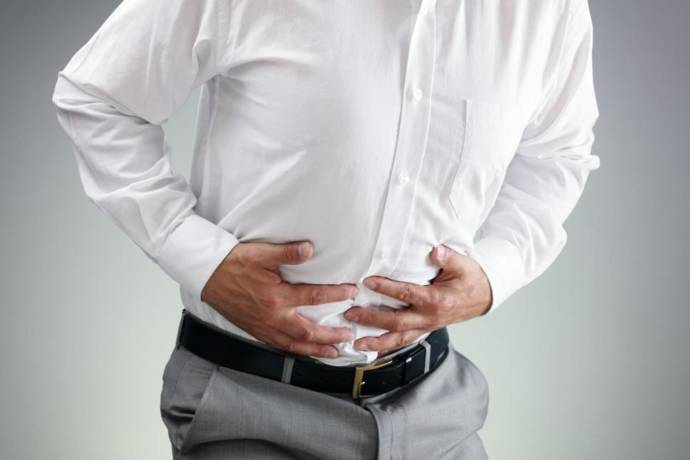Constipation is the disorder of gastrointestinal tract characterized by the presence of hard stools which are difficult to defecate. Constipation may be primary or secondary and acute or chronic. Diagnosis is done through imaging techniques and the causes of constipation include low fiber diet, insufficient intake of water, medications and other diseases.
Types
Constipation can be divided into two types on the basis of the cause of constipation:
- Primary constipation: This type of constipation does not have any underlying reason such as medications or any metabolic disease. Primary constipation further divided into the following types:
a) Slow transit constipation: This type of constipation is caused due to the low speed of bowel movement and may lead to gas formation and patient discomfort.
b) Pelvic floor dysfunction: Inappropriate anorectal functioning is the primary cause of such constipation. It may be due to poor anal contraction as well as relaxation.
c) Normal-transit constipation: This type of constipation is due to psychological distress and even with normal transit and perfection anorectal functioning, the patient feels difficulty in bowel evacuation. - Secondary constipation: Secondary constipation is caused due to disorders which reduces the bowel movement. This includes Parkinson’s disease, neurological disorder, multiple sclerosis, inflammatory bowel disease, and hypothyroidism. Medications such as clonidine, propranolol, and opioid drugs also cause constipation.
Constipation can also be classified based on duration:
- Acute constipation: Acute constipation is a sudden difficulty in bowel evacuation. This condition is caused by medications, dehydration, certain medications and missing a bowel movement.
- Chronic constipation: Chronic constipation is the condition characterized by the painful bowel evacuation or fecal incontinence for a long period of time, specifically three months or more.
Causes
Following are the causes of constipation:
- Medications: Various medications such as antidepressants, clonidine, propranolol, opioids, and diuretics slows the movement of bowel in the gastrointestinal tract.
- Lifestyle: People with low fibers in their food and do not drink sufficient water are significantly at risk of developing constipation.
- Missing bowel movements: Frequently missing bowel movements causes constipation.
- Medical Disorders: Various diseases such as hypothyroidism, Parkinson’s disease, colon cancer, and neurological disorders also causes constipation.
- Overusing laxatives: People who are in the habit of using laxatives frequently, are at risk of developing constipation.
- Lack of physical activity: No exercise in daily routine also causes constipation. It should also be noted that too much exercise may also interfere in the bowel movements.
Symptoms
Following are the symptoms presented by the patient suffering from constipation:
- Dry, lumpy or hard stools
- Fecal incontinence
- Painful bowel evacuation
- Feeling of blockage in the rectum
- Fatigue and lethargy
- Discomfort and restlessness
- Reduced appetite
- Pain in the abdomen
- Bloating and belching
- Feels like you have not emptied your stomach even after you have a bowel movement
- Less than three bowel movements a week.
Ways to diagnose
Following are the diagnostic methods used by the physician for diagnosing constipation:
- a) Colonoscopy: Tube equipped with a camera is used to determine the functional ability of the colon.
- b) Sigmoidoscopy: Through this technique, the physician evaluates the health of rectum.
- c) Anorectal manometry: This diagnostic technique is used to identify the functional capacity of sphincter muscles. A small tube is inserted in the rectum and the balloon at the tip is inflated. This tube is pushed by the sphincter muscles.
- d) MRI: MRI of the colon is done with the help of contrast gel. MRI is used to analyze the functional ability of the gastrointestinal muscles.
- e) Blood tests: Blood test is done by the physician in determining the cause of secondary constipation.
Risks if neglect
- Rectal prolapse: In this condition, the intestine protrudes from the rectum.
- Fecal impaction: This stage is characterized by the presence of very hard stools which cannot be evacuated.
- Anal fissures: The tissue around the anus is damaged due to apple force during defecation.
- Hemorrhoids: When high pressure is applied on the rectum during constipation, the veins around anus gets irritated and swollen.
Stages
Constipation is progressed in the following stages:
- Functional constipation: This is the first stage of constipation characterized by incomplete evacuation, defecation incontinence, and sensation of blockage. This is due to a sudden change in diet as well as missing the bowel movement.
- Latent constipation: If the person needs a large fibre diet and laxatives for a normal bowel movement, the disease is said to be processed into the latent stage.
- Organic constipation: This stage is the advanced stage of constipation characterized by no stools. This is caused due to permanent organ damage or loss of functional ability.
Foods to eat and avoid
Foods to eat:
- Water and other fluids such as juices.
- Pulses
- Broccoli
- Fiber-rich fruits and vegetables
- Wheat Bran
- Nuts
- Hot tea
Foods to avoid:
- Milk and dairy products
- Alcohol
- Bananas
- Red meats
- Fried or frozen foods
- White flour
- Apricots
- Rice
Prevention tips
- Eat a high-fiber diet.
- Incorporate exercise in your daily routine.
- During sufficient quantity of water.
- Always go for bowel movement when there is an urge.
- Ask your doctor before taking any laxative.
When to see a doctor
Visit your doctor if:
- You have blood from your rectum.
- You feel the blockage in the rectum.
- You are not able to pass gas.
- You have less than three bowels per week.
- You have fecal incontinence even after taking prescribed medications.
- You have blood in stools.
- You have constant abdominal pain.
- You have a feeling of nausea and vomiting.
Do’s & Don’ts
Do’s
- Always be sufficiently hydrated.
- Have a healthy diet especially containing fibers.
- Incorporate fresh fruits in your diet.
- Do regular exercise.
- Maintain routine for your bowel movement.
Don’ts
- Don’t take excessive dairy products.
- Avoid caffeinated drinks.
- Avoid alcohol.
- Avoid processed meat.
- Never suppress the urge for a bowel movement.
- Do not self-medicate with laxatives.
- Do not skip meals.
Risks for specific people
People older than 65 years are at higher risk for developing constipation. Women are more likely to develop constipation and risk increases during pregnancy or surgery. People with dehydration, having low fiber diet and with less physical activity are more prone to developing constipation.





